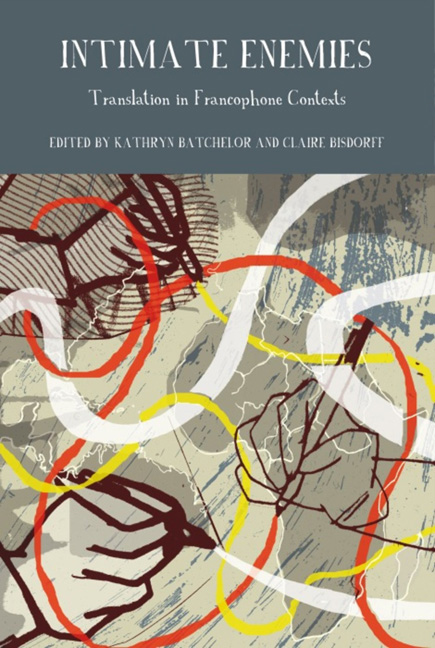Book contents
- Frontmatter
- Contents
- Illustration
- Acknowledgements
- Introduction: Translation – Formidable Enemy or Needed Friend?
- The Translation Market: Publishing and Distribution
- Writing and Translating in Practice
- Translation Challenges and New Avenues in Postcolonial Translation Theory
- Subverting Subversion? Translation Practice and Malpractice in the Work of Patrick Chamoiseau
- ‘Un art de la fugue’: Translating Glissant's Poetry, Fiction and Prose d'idées
- Postcolonial Intertextuality and Translation Explored through the Work of Alain Mabanckou
- Ananda Devi as Transcolonial Translator
- Translation and Current Trends in African Metropolitan Literature
- Notes on Contributors
- Index
Translation and Current Trends in African Metropolitan Literature
from Translation Challenges and New Avenues in Postcolonial Translation Theory
- Frontmatter
- Contents
- Illustration
- Acknowledgements
- Introduction: Translation – Formidable Enemy or Needed Friend?
- The Translation Market: Publishing and Distribution
- Writing and Translating in Practice
- Translation Challenges and New Avenues in Postcolonial Translation Theory
- Subverting Subversion? Translation Practice and Malpractice in the Work of Patrick Chamoiseau
- ‘Un art de la fugue’: Translating Glissant's Poetry, Fiction and Prose d'idées
- Postcolonial Intertextuality and Translation Explored through the Work of Alain Mabanckou
- Ananda Devi as Transcolonial Translator
- Translation and Current Trends in African Metropolitan Literature
- Notes on Contributors
- Index
Summary
Introduction: Redirecting Resistance
It is generally agreed that the ‘cultural turn’ in Translation Studies significantly altered the field from the 1990s onward, broadening its base from a mainly linguistic approach to a sociocultural and ideological inquiry of translation phenomena. This opened up other research avenues such as gender and postcolonialism, which seek to account for the significance of power imbalance in translation practice. Postcolonialism has had a significant impact on Translation Studies, moving the field from its Eurocentric preoccupations to a more global perspective. There is a growing body of work on a variety of non-Western cultures such as African, Indian and Latin American cultures. However, these non-Western contexts have often been presented as foils or counters to what is considered to be a hegemonic Western culture. Given the dualism inherent in translation, postcolonial translation research quickly conformed to the contrastive and oppositional forms of analysis characteristic of translation research. Binaries, dichotomies and contrastive dualisms came with the territory, and postcoloniality in translation research followed the practice in other fields and was cast in terms of ‘us’ versus ‘them’ or ‘colonizer’ versus ‘colonized’. Postcolonial translation discourse has simply followed the trend in the broader field of postcolonial studies. However, as Fanon (1966; 1967) pointed out decades earlier, the knee-jerk opposition of the colonizer and the colonized obscures or overlooks the machinations of internal oppression within the colonies. In more recent times, a similar view has been espoused by Achille Mbembe (2001) who laments the fact that Africa is hardly ever studied in and of itself, but rather as a sounding board for Western modernism. All studies of resistance are approached in terms of opposition to the West, thus overlooking other forms of struggle and power inequality in the postcolony. This study seeks to overcome such colonial essentialism by shifting the focus away from the métropole and onto the dynamics of class and power that underlie power relations in the postcolony. In keeping with current trends in postcolonial literature, art and aesthetics – which for the most part showcase works that depict life as it is lived in postcolonial societies – this chapter focuses on translation as a fact of life in postcolonial contexts.
Although the Global South is still very much under the dominance of hegemonic powers, many postcolonial struggles occur also from within: intra-national rather than anti-colonialist.
- Type
- Chapter
- Information
- Intimate EnemiesTranslation in Francophone Contexts, pp. 235 - 252Publisher: Liverpool University PressPrint publication year: 2013

